#18-19 brumaire
Explore tagged Tumblr posts
Text
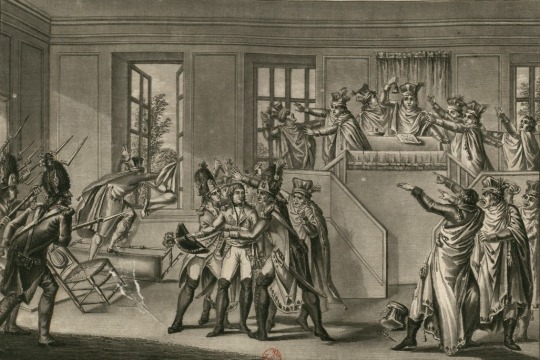
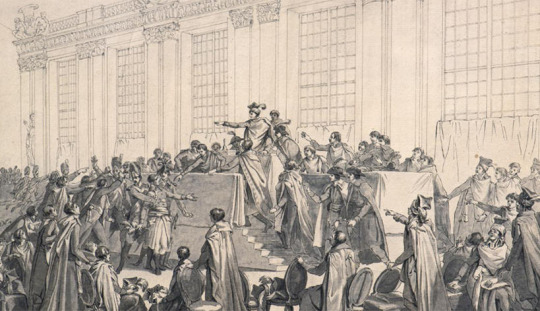
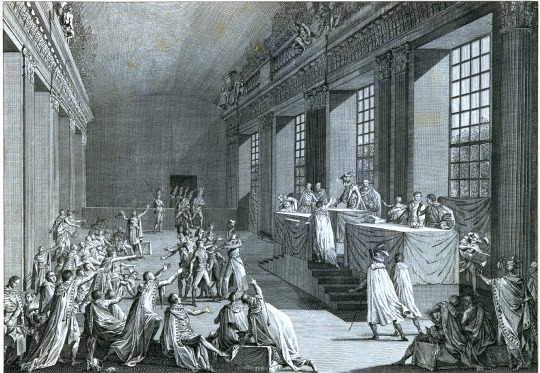
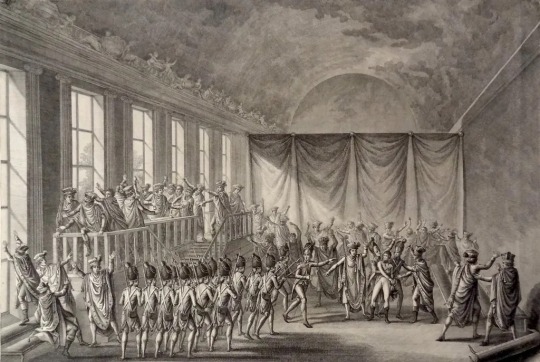
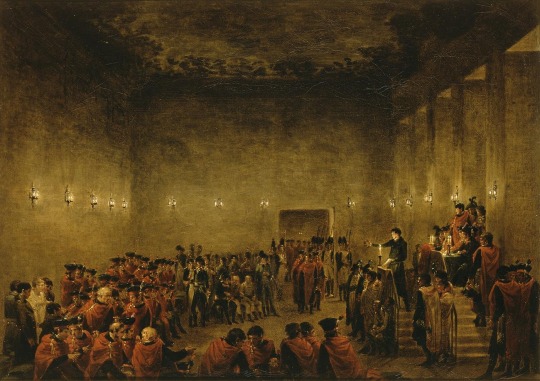
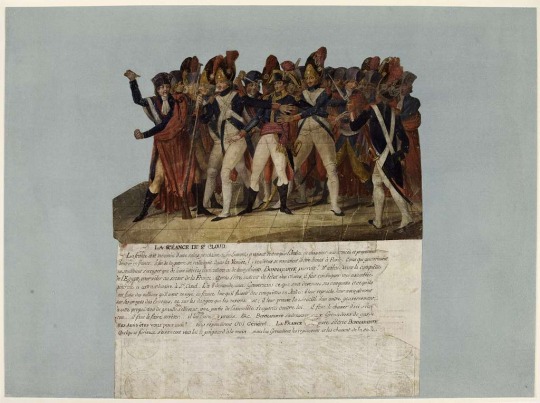
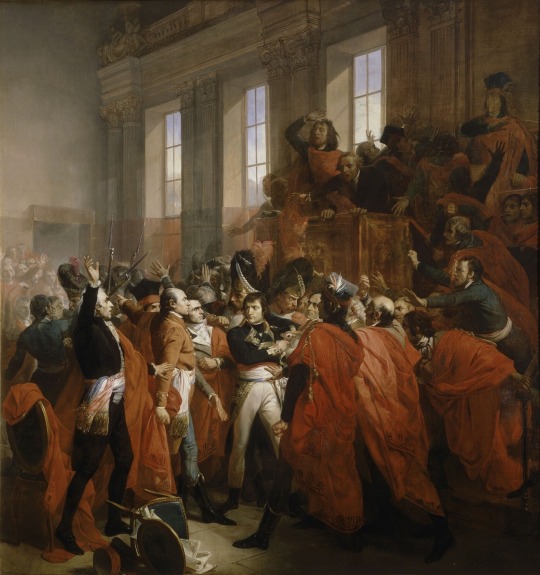

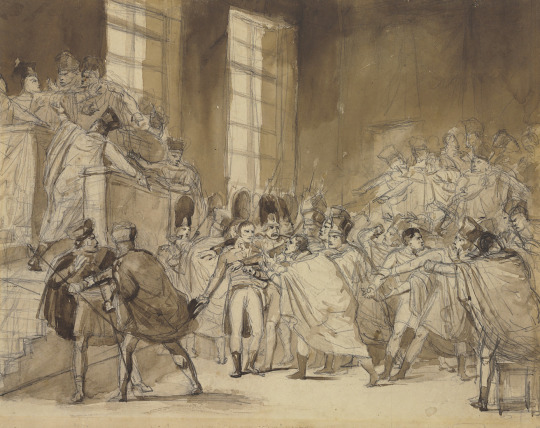
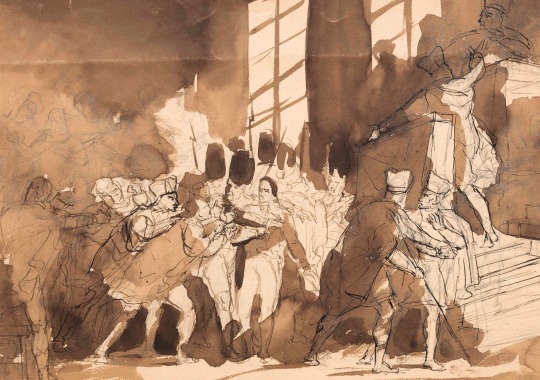
Scenes from 18-19 Brumaire
Jean-Baptiste Morret, Séance du Conseil des Cinq-Cents tenue a St Cloud le 19 brumaire an huit, 1799
C. Chardon (imprimeur), Isidore Stanislas Helman, Journée de Saint-Cloud, le 18 brumaire an 8, 9 Novembre 1799, Musée de la Révolution française
Coup d'État du 18 Brumaire dans l'Orangerie de Saint-Cloud, Domaine national de Saint-Cloud
Gravé par Le Beau d’après Naudet, Coup d'État du 18 Brumaire an VIII
Jacques Sablet, Le Dix-Neuf Brumaire
Jean Baptiste Lesueur, Coup d'Etat des 18-19 brumaire an VIII : Bonaparte menacé par les députés du Conseil des Cinq-Cents, Saint Cloud, le 10 novembre 1799
François Bouchot, Orangerie du parc de Saint-Cloud — Coup d'État des 18-19 brumaire an VIII — Le général Bonaparte au Conseil des Cinq-Cents, à Saint Cloud. 10 novembre 1799
Giacomo Aliprandi, Francisco Vieira ‘Portuense’, Napoleon entering council chamber at St. Cloud, protected by guards with fixed bayonets against daggers of council members
Alexandre-Évariste Fragonard (1780-1850), The Coup of XVIII Brumaire: Bonaparte before the Council of Five Hundred
François Bouchot, Coup d’Etat du XVIII Brumaire : le général Bonaparte au conseil des Cinq-Cents à Saint-Cloud pencil, pen and brown ink and brown wash on paper (A study for the painting at the National Museum of Versailles)
#Brumaire#Napoleon#napoleonic era#napoleonic#napoleon bonaparte#18 Brumaire#18th brumaire#eighteen brumaire#eighteenth brumaire#France#history#french history#first french empire#french empire#1799#1700s#18-19 brumaire#art#painting#drawing#french revolution#illustration#Art history#sketch
62 notes
·
View notes
Text

The Coup d'État of 18-19 Brumaire - General Bonaparte in the Conseil des Cinq-Cents (Council of Five Hundred) at Saint-Cloud, 10th November 1799
by François Bouchot
#napoléon bonaparte#napoleon bonaparte#coup d'etat#art#france#françois bouchot#history#europe#european#saint cloud#château#paris#french#napoleonic#napoléon#napoleon#bonaparte#versailles#château de versailles#palace of versailles
125 notes
·
View notes
Text
Judgments pronounced month by month by the Paris Revolutionary Tribunal, from its installation to its abolition
Source: Le Tribunal révolutionnaire de Paris: d’après les documents originaux conservés aux archives de l’Empire, suivi de la liste complète des personnes qui ont comparu devant ce tribunal (1866) by Émile Campardon, volume 2, page 217-225
Tribunal from March 10 1793
April 1793 (6 to 30) Death sentences……………………..9 Acquittals or releases[1]……………16 Sent to a different tribunal………….1 Total number of accused……………26
May 1793 (1 to 31) Death sentences………………….….9 Acquittals or releases…………….….23 Sent to a different tribunal……….….2 Total number of accused………...….34
June 1793 (1 to 30) Death sentences…………………….15 Acquittals or releases……………….33 Deportations…………………………..3 Sent to a different tribunal…..……….2 Total number of accused………..…..53
July 1793 (1 to 31) Death sentences……………….…….14 Acquittals or releases……….……….47 Deportations…………………………..1 Confinement…………………………..2 Prison……………………………….….1 Sent to a different tribunal………..…..1 Total number of accused……………..66
August 1793 (1 to 31) Death sentences………………...…….5 Acquittals or releases……………..….36 Deportations…………………….……..1 Confinement……………………………1 Sent to a different tribunal………..…..2 Total number of accused……..………45
September 1793 (1 to 30) Death sentences…………………….17 Acquittals or releases……………….37 Deportations………………………….6 Confinement…………………….……1 Sent to a different tribunal…..……...1 Total number of accused……………62
October 1793 (1 to 8) Death sentences…………………….13 Acquittals or releases……………….11 Confinement…………………………..1 Prison………………………………….5 Total number of accused…………....30
Vendémiare year II (September 22 to October 21 1793) Death sentences…………………….10 Acquittals or releases……………….11 Deportations…………………………..1 Confinement…………………………..2 Prison…………………………………..9 Total number of accused………..…..33
Brumaire year II (October 22 to November 20 1792) Death sentences………………..…….65 Acquittals or releases…………..…….45 Deportations…………………….……..1 Banishment…………………….……….2 Confinement………………………..…..5 Prison………………………………….…2 Seclusion………………………….……..1 Total number of accused……….……..33
Frimaire year II (November 21 to December 20 1792) Death sentences……………….……….67 Acquittals or releases…………………..91 Deportations……………………………..2 Confinement……………………..………3 Prison………………………………….….3 Total number of accused……………….166
Nivôse year II (December 21 1793 to January 19 1794) Death sentences…………………..…….61 Acquittals or releases…………….…….101 Confinement……………………….……..2 Prison………………………………..….…3 Total number of accused………………..167
Pluviôse year II (January 20 to February 18 1794) Death sentences………………………….68 Acquittals or releases…………………….106 Deportations………………………..……..12 Confinement………………………………..5 Prison…………………………………….…3 Sent to a different tribunal…………….….4 Total number of accused…………………198
Ventôse year II (February 19 to March 30 1794) Death sentences………………………….116 Acquittals or releases…………………….79 Deportations…………………………..…..5 Confinement……………………..………..1 Sent to a different tribunal……………….5 Total number of accused…………………206
Germinal year II (March 21 to April 19 1794) Death sentences…………………… ..….155 Acquittals or releases……………….…….59 Prison…………………………..……..….…3 Sent to a different tribunal…………….….1 Total number of accused…………………218
Floréal year II (April 20 to May 19 1794) Death sentences…………………….…….354 Acquittals or releases…………………….155 Confinement……………………………….4 Prison…………………………………….…6 Seclusion……………………………..…….4 Total number of accused……………..…..525
Prairial 1 to 22 year II (May 20 to June 10 1794) Death sentences…………………….…….281 Acquittals or releases…………………….120 Confinement……………………..………..6 Sent to a different tribunal……………….1 Total number of accused…………………408
After the law of 22 Prairial is passed
Prairial 22 to 30 year II (June 10 to June 18 1794) Death sentences………………………….228 Acquittals or releases…………………….44 Total number of accused…………………272
Messidor year II (June 19 to July 18 1794) Death sentences………………………….796 Acquittals or releases…………………….208 Confinement……………………..………..1 Total number of accused…………………1005
Thermidor 1 to 9 year II (July 19 to July 27 1794) Death sentences………………………….796 Acquittals or releases…………………….208 Confinement………………………..……..1 Total number of accused…………………1005
Thermidor 10, 11 and 12 year II (July 28, 29, 30 1794) Death sentences after outlaw declaration…….103
Thermidor 27 to 1 Sans-Culottides (August 14 to September 17 1794) Death sentences…………………….…….14 Acquittals or releases…………………….273 Sent to a different tribunal……………….3 Total number of accused…………………290
1 Sans-Culottides to Brumaire 1 year III (September 17 to October 22 1794) Death sentences………………………….24 Acquittals or releases………………..…..242 Deportations………………………..……..2 Prison………………………….…………..1 Confinement………………….…………..38 Sent to a different tribunal………..…….4 Total number of accused………….……311
Brumaire year III (October 22 to November 20 1794) Death sentences………………….…….5 Acquittals or releases…………………..223 Confinement……………………………..8 Total number of accused……….………236
Frimaire 1 to 28 year III (November 21 to December 18 1794) Death sentences…………………..…….3 Acquittals or releases…………………..99 Confinement……………………………..2 Sent to a different tribunal………..……1 Total number of accused………………105
Tribunal of 8 Nivôse, installed Pluviôse 8 year III (January 27 1795)
Pluviôse year III (January 20 to February 18 1795) Acquittals or releases……………..…..17 No accusation………………….………3 Sent to a different tribunal……………10 Total number of accused………..……30
Ventôse year III (February 19 to March 20 1795) Death sentences……………………….1 Acquittals or releases………..………..16 Confinement…………………. ………..2 Sent to a different tribunal………….…2 Total number of accused………………21
Germinal year III (March 21 to April 19 1795)
Acquittals or releases……………..…..4 Confinement………………..…………..1 Sent to a different tribunal……….……7 Total number of accused………..……12
Floréal year III (April 20 to May 19 1795) Death sentences…………………….16 Acquittals or releases……………….17 Confinement…………………………..3 Sent to a different tribunal……….….10 Total number of accused……………46
—
From April 6 1793 to 22 prairial year II (June 10 1794) 2358 accused appeared before the revolutionary tribunal and were judged the following way:
Death sentences…………………….1258 Acquittals or releases………………..969 Deportations…………………………..34. Prison…………………………………..28 Confinement…………………………..40 Sent to a different tribunal……….….23 Banishment……………………………2 Seclusion……………………………….3 Total number of accused…………2358
From 22 prairial to 9 thermidor year to (June 10 to July 28 1794) 1703 accused, judged as followed:
Death sentences…………………….1366 Acquittals or releases……………….336 Confinement……………………………..1 Total number of accused………..…1703
On 10, 11 and 12 thermidor, 103 people declared outlaws were executed.
From 24 thermidor year II to 28 frimaire year III (August 11 - December 18 1794)
Death sentences…………………….46 Acquittals or releases……………….837 Confinement…………………………48 Sent to a different tribunal……….….8 Deportations…………………………..2 Prison…………………………………...1 Total number of accused……….……942
Finally, from 8 pluviôse to 28 floréal year III (January 27 to May 17 1795) 109 were judged as follows:
Death sentences…………………….17 Acquittals or releases……………..54 Confinement…………………………..6 Sent to a different tribunal……….29 Non-indictment.……………………….3 Total number of accused…………109
[1] The aquittal was pronounced by the tribunal sitting in open court, and release by the tribunal assembled in the Council Chamber.
21 notes
·
View notes
Text
Fun thing I learned in A-level history today:
So. During the French Revolution, the French Revolutionaries wanted to separate the state from the Church as much as possible. So much so, that they went as far as to introduce a new calendar, the "French Republican Calendar" (also known as the "French Revolutionary Calendar". Day 1, year 1 of this calendar was 22nd September 1792 (Gregorian Calendar), the day France was declared a republic.
Now, the 12 months of the calendar contained 3 décades of 10 days each (rather than our 4 weeks of 7 days). The months had their names changed to the ones below:

[id: picture of the French Republican Calendar. The title reads "The New Republican Calendar". Under it there are three columns as reproduced below:
New Name Meaning Time Period
Vendemaire Vintage September 22 - October 21
Brumaire Fog October 22 - November 20
Frimaire Frost November 21 - December 20
Nivose Snow December 21 - January 19
Pluvoise Rain January 20 - February 18
Ventose Wind February 19 - March 20
Germinal Budding March 21 - April 19
Florea Flowers April 20 - May 19
Prairial Meadow May 20 - June 18
Messidor Harvest June 19 - July 18
Thermidor Heat July 19 - August 17
Fructidor Fruit August 18 - September 21
"New Name" column is written in red, "Meaning" column is written in blue, and "Time Period" column is written in black. There are vertically extended versions of the French flag on Esther side of the table /end id]
All this to say, my name is Raine (pronounced Rain) and my birthday falls in Pluvoise (Rain). Love when my special interests confirm that I truly chose the right name.
#history#french revolution#french republican calendar#for me#Raine born in Rain#whispers of the raine
7 notes
·
View notes
Text
Events 11.9 (before 1950)
694 – At the Seventeenth Council of Toledo, Egica, a king of the Visigoths of Hispania, accuses Jews of aiding Muslims, sentencing all Jews to slavery. 1277 – The Treaty of Aberconwy, a humiliating settlement forced on Llywelyn ap Gruffudd by King Edward I of England, brings a temporary end to the Welsh Wars. 1313 – Louis the Bavarian defeats his cousin Frederick I of Austria at the Battle of Gammelsdorf. 1330 – At the Battle of Posada, Basarab I of Wallachia defeats the Hungarian army of Charles I Robert. 1456 – Ulrich II, Count of Celje, last ruler of the County of Cilli, is assassinated in Belgrade. 1520 – More than 50 people are sentenced and executed in the Stockholm Bloodbath. 1620 – Pilgrims aboard the Mayflower sight land at Cape Cod, Massachusetts. 1688 – Glorious Revolution: William of Orange captures Exeter. 1720 – The synagogue of Judah HeHasid is burned down by Arab creditors, leading to the expulsion of the Ashkenazim from Jerusalem. 1729 – Spain, France and Great Britain sign the Treaty of Seville. 1780 – American Revolutionary War: In the Battle of Fishdam Ford a force of British and Loyalist troops fail in a surprise attack against the South Carolina Patriot militia under Brigadier General Thomas Sumter. 1791 – The Dublin Society of United Irishmen is founded. 1799 – Napoleon Bonaparte leads the Coup of 18 Brumaire ending the Directory government, and becoming First Consul of the successor Consulate Government. 1851 – Kentucky marshals abduct abolitionist minister Calvin Fairbank from Jeffersonville, Indiana, and take him to Kentucky to stand trial for helping a slave escape. 1862 – American Civil War: Union General Ambrose Burnside assumes command of the Army of the Potomac, after George B. McClellan is removed. 1867 – The Tokugawa shogunate hands back power to the Emperor of Japan, starting the Meiji Restoration. 1872 – The Great Boston Fire of 1872. 1881 – Mapuche rebels attack the fortified Chilean settlement of Temuco. 1887 – The United States receives rights to Pearl Harbor, Hawaii. 1900 – Russia completes its occupation of Manchuria with 100,000 troops. 1906 – Theodore Roosevelt is the first sitting President of the United States to make an official trip outside the country, doing so to inspect progress on the Panama Canal. 1907 – The Cullinan Diamond is presented to King Edward VII on his birthday. 1913 – The Great Lakes Storm of 1913, the most destructive natural disaster ever to hit the lakes, reaches its greatest intensity after beginning two days earlier. The storm destroys 19 ships and kills more than 250 people. 1914 – SMS Emden is sunk by HMAS Sydney in the Battle of Cocos. 1917 – The Balfour Declaration is published in The Times newspaper. 1918 – Kaiser Wilhelm II of Germany abdicates after the German Revolution, and Germany is proclaimed a Republic. 1923 – In Munich, police and government troops crush the Nazi Beer Hall Putsch. 1935 – The Committee for Industrial Organization, the precursor to the Congress of Industrial Organizations, is founded in Atlantic City, New Jersey, by eight trade unions belonging to the American Federation of Labor. 1937 – Second Sino-Japanese War: The Chinese Army withdraws from the Battle of Shanghai. 1938 – Kristallnacht occurs, instigated by the Nazis using the killing of German diplomat Ernst vom Rath by Herschel Grynszpan as justification. 1940 – Warsaw is awarded the Virtuti Militari by the Polish government-in-exile.
0 notes
Text
Французский революционный календарь

Деятели Великой французской революции, ставившие перед собой задачу фундаментального переустройства мирового порядка, разумеется не могли обойти своим вниманием систему летоисчисления и стандарты измерения времени.
Григорианский календарь был на законодательном уровне упразднён за ненадобностью и заменён новым, революционным, календарём. Отменены, точнее сказать, изменены, были также и единицы измерения времени час, минута и секунда.
Впрочем давайте обо всём по порядку.
Французский революционный календарь был введён во Франции в ходе Великой французской революции декретом Национального конвента от 5 октября 1793 года. Согласно этому декрету, отсчёт лет начинался с 22 сентября 1792 года. Календарь был разработан специальной комиссией и знаменовал разрыв с традициями и дехристианизацию.
Официальное название нового календаря звучало так – calendrier républicain (республиканский календарь). Название Французский революционный календарь является, хотя и более распространённым, но неофициальным вариантом наименования этого изобретения человеческой мысли.
Календарь просуществовал 12 лет, пока Наполеон не отменил его и не восстановил с 1 января 1806 года действие григорианского календаря.
Республиканский календарь был ещё раз возвращён к жизни в 1871 году на 18 дней во время быстротечных событий Парижской коммуны (18 марта – 28 мая 1871 года). После этого вновь был введён григорианский календарь, а республиканский календарь окончательно перешёл в категорию исторических курьёзов.
Летоисчисление, как уже было сказано, должно было начинаться с 22 сентября 1792 года. Этот день стал первым днём первого года «Республиканской эры». Соответственно, отсчёт лет «от Рождества Христова» отменялся, равно как отменялось и начало года, приходившееся прежде на 1 января.
Начало каждого года должно было приходиться на день осеннего равноденствия, определяемый Парижской обсерваторией, что позволяло обеспечить точность календаря. По удачному совпадению, первый день республики, когда была упразднена монархия, 22 сентября 1792 года, приходился в тот год как раз на день осеннего равноденствия.
Год Республиканского календаря состоял из 12 месяцев по 30 дней каждый. Оставшиеся 5 дней (или 6 – в високосные годы) с самого начала служили, как добавочные праздничные дни календаря. Назывались эти дни «Санкюлотиды» (в честь санкюлотов – революционно настроенного класса горожан, ставших движущей силой французской революции).
Месяцам были придуманы новые названия, связанные с природными явлениями и сельскохозяйственной деятельностью.
Осень:
Вандемьер (фр. Vendémiaire) (22 сентября — 21 октября) — месяц сбора винограда.
Брюмер (фр. Brumaire) (22 октября — 20 ноября) — месяц туманов.
Фример (фр. Frimaire) (21 ноября — 20 декабря) — месяц заморозков.
Зима:
Нивоз (фр. Nivôse) (21 декабря — 19 января) — месяц снега.
Плювиоз (фр. Pluviôse) (20 января — 18 февраля) — месяц дождя.
Вантоз (фр. Ventôse) (19 февраля — 20 марта) — месяц ветра.
Весна:
Жерминаль (фр. Germinal) (21 марта — 19 апреля) — месяц прорастания.
Флореаль (фр. Floréal) (20 апреля — 19 мая) — месяц цветения.
Прериаль (фр. Prairial) (20 мая — 18 июня) — месяц лугов.
Лето:
Мессидор (фр. Messidor) (19 июня — 18 июля) — месяц жатвы.
Термидор (фр. Thermidor) (19 июля — 17 августа) — месяц жары.
Фрюктидор (фр. Fructidor) (18 августа — 16 сентября) — месяц плодов.
Старые названия месяцев (январь, февраль и т.д.) – упразднялись.
Неделя, состоявшая из семи дней тоже упразднялась. Вместо недели, месяц теперь состоял из трёх декад, каждая по 10 дней.
Дни декады именовались просто порядковыми числительными:
Примиди (фр. Primidi) — 1-й день декады.
Дуоди (фр. Duodi) — 2-й день декады.
Триди (фр. Tridi) — 3-й день декады.
Квартиди (фр. Quartidi) — 4-й день декады.
Квинтиди (фр. Quintidi) — 5-й день декады.
Секстиди (фр. Sextidi) — 6-й день декады.
Септиди (фр. Septidi) — 7-й день декады.
Октиди (фр. Octidi) — 8-й день декады.
Нониди (фр. Nonidi) — 9-й день декады.
Декади (фр. Decadi) — 10-й день декады.
В качестве официального выходного был определён только последний – десятый день каждой декады, прочие дни считались рабочими.
Добавочные дни каждого года – Санкюлотиды, также имели каждый своё название:
День Доблести/Добродетели (фр. La Fête de la Vertu) — 17 сентября.
День Таланта (фр. La Fête du Génie) — 18 сентября.
День Труда (фр. La Fête du Travail) — 19 сентября.
День Мнений (фр. La Fête de l'Opinion) — 20 сентября.
День Наград (фр. La Fête des Récompenses) — 21 сентября.
День Революции (фр. La Fête de la Révolution) (в високосные годы канун дня равноденствия).
Руководствуясь идеей дехристианизации, революционеры придумали и собственные революционные святки. Взамен старых святочных списков, когда почти каждому дню календаря соответствовал тот или иной святой, в новой системе дни календаря были посвящены растениям, животным, минералам, или орудиям труда. Полный перечень привести в статье затруднительно, так как он слишком велик по объёму. Современному читателю просто ��е знакомы большинство названий перечисленных растений, поэтому республиканские святки можно читать как учебник ботаники. Надо сказать, что список этот обнаруживает глубокий эстетизм французских революционеров.
Названия некоторых месяцев республиканского календаря приобрели впоследствии нарицательное значение. Например, 18-го брюмера 8-го года Республики Наполеон совершил государственный переворот и взял власть в свои руки. С тех пор в политической истории понятие «брюмер» используется как для обозначения конкретно этого события, так и подобных переворотов вообще. Название месяца «термидор» стало символичным для обозначения всякого контрреволюционного переворота, так как 9-го термидора 2-го года Республики произошёл т.н. термидорианский переворот, в результате которого была ликвидирована якобинская диктатура и был положен конец Французской революции.
Революционной реформе подверглись также часы, минуты и секунды. Сутки теперь состояли из 10 часов. Каждый час – из 100 минут, а каждая минута – из 100 секунд.
Соотношение между старыми и новыми часами минутами и секундами было следующее:
Час (революционный) (фр. heure) (1/10 дня) = 2 часа 24 минуты.
Минута (революционная) (фр. minute) (1/100 часа) = 1 минута 26,4 секунды.
Секунда (революционная)(фр. seconde) (1/100 минуты) = 0,864 секунды.
Революционные часы, минуты и секунды, как официальные единицы измерения времени, были отменены в 1795 году, то есть просуществовали значительно меньше, чем революционный календарь, который «дожил» аж до 1806 года.
© 2022


#время #календарь #хронология #пространствавремени #книги #литература #история #наука #техника #искусство #культура #французскаяреволюция #time #calendar #chronology #spacesoftime #books #science #technology #culture #universe #секунда #час #минута #брюмер #термидор #наполеон #история
12 notes
·
View notes
Text
18 Brumaire
"Bonaparte did not have a well-defined plan of action when he reached Paris, but he was soon approached by a group of statesmen conspiring against the current French government. Led by Emmanuel Sieyès (himself a member of the Directory), these men thought they could control a simple military man like Bonaparte and were eager to exploit his status as war hero for their political gain. Yet Bonaparte was anything but simple. On his arrival in Paris, he adopted the role of the modest and studious citizen, meeting with savants, delivering speeches on the scientific work of the Egyptian expedition at the Institut de France, and in general portraying himself as eager for knowledge and respectful of intellect. But deep in his heart he knew that "change is here indispensable", and he closely observed political undercurrents, exploring every party and faction - there may have been more than half a dozen active plots against the Directory- before committing to one. Sieyès and his co-conspirators would soon realize that they had misdjudged this man. They envisioned a manipulable "sword" that they could use to see the conspiracy through and then quietly "sheathe" in the aftermath. None foresaw that after effectively putting him in power they would be on the outside looking in.

On November 9-10 (Brumaire 18-19), the conspirators put their plans in motion. Claiming an imminent threat of a Jacobin plot, they induced both legislative councils to transfer their sessions to the relative safety (and isolation) of the former royal palace at St. Cloud, where their security would be ensured by Bonaparte and his troops. At the same time, the whole Directory resigned, starting with Sieyès himself; some members did so under pressure, and for others the process was sweetened with a bribe. Despite success on the eighteenth of Brumaire, matters did not go smoothly the following day, when the legislative council demanded explanations. Bonaparte's intervention only heightened tensions as he was mobbed and manhandled in the Council of Five Hundred, with some deputies denouncing him as an "outlaw". His brother Lucien Bonaparte, who served as president of the Council of Five Hundred, saved the day. Maintaining a cool head, he declared to the troops outside that an assassination attempt had been made on his brother and called upon them to restore order. In the highly charged atmosphere, this claim was enough to sway the troops and induce them to obey orders to dissolve the councils. Later the same night a compliant rump of the legislative councils was reassembled to formally vote on the dissolution."
Alexander Mikaberidze- The Napolenic Wars, A Global History
#napoleonic#alexander mikaberidze#the napoleonic wars: a global history#18 brumaire#napoléon bonaparte#emmanuel sieyès#lucien bonaparte
5 notes
·
View notes
Text
L’article 1240 du code civil français

Traditionnellement, il a été affirmé qu'en matière de responsabilité civile et en particulier, en matière de faute, le Code Napoléon suivait, comme en d'autres matières, les idées juridiques de Domat et, plus encore, la perspective éthique de la juriste française.
Étant l'un des grands modèles codifiés du droit continental, cette vision de la culpabilité aurait été transférée à ses homologues, ce qui vaudrait les critiques ultérieures de la tradition civile.
Il est également avancé que la règle générale de la responsabilité civile, fondée sur la faute, se fonde sur la tradition juridique Domat, ce qui équivaut à identifier l'auteur avec le courant du droit naturel rationaliste.
Le but de ce travail est de remettre en cause la thèse traditionnelle. En matière de responsabilité civile, l’Article 1240 Code civil utilise l'expression faute et en cela elle coïncide naturellement avec Domat : compte tenu de son appartenance à la grammaire de Port Royal, Domat écrit en français, langue qui n'incorpore pas le nom latin culpa, comme le feraient les autres Langues romanes .
Cependant, comme nous le montrerons dans cet ouvrage, on ne peut supposer que le Code embrasse la perspective méthodologique, la vision éthique et l'anthropologie de Domat, un auteur complexe qui à son tour puise ses idées dans le rationalisme naturaliste, le pessimisme janséniste et l'empirisme de Pascal, sans suivant l'un de ces référents.
Ni la répudiation de la rationalité pascalienne, ni un empirisme mécaniste exclusif, ni la laïcité propre au droit naturel rationaliste ne trouvent leur pleine acceptation chez Domat, comme nous allons l'analyser en détail.
Pour traiter ce problème, nous examinerons brièvement la genèse (dans les différents projets du Code) des règles de responsabilité civile qui ont finalement été inscrites dans le Code et la place qu'occupait cette faute parmi les règles d'attribution des dommages-intérêts.
Ce bref contexte nous permettra d'examiner les lectures qui, postérieurement à l'entrée en vigueur du Code civil français, se rapportent à la responsabilité civile aquilienne et à la place qu'y a joué la culpabilité.
La thèse traditionnelle, comme cela a été soutenu, élabore comme paradigme l'idée de culpabilité comme critère subjectif de reproche moral pour l'auteur, qui répondrait à une société individualiste et préindustrielle. Dans la dernière partie de l'article, nous argumenterons contre cette position traditionnelle,
II. LE CONTEXTE HISTORIQUE : DES PROJETS DU CODE CIVIL À LA CONSÉCRATION DES RÈGLES DE CULPABILITÉ
A. Brève référence à l'historique et à la structure du Code
Les efforts de codification en France surviennent très tôt. En effet, à la suite de Fenet, le 24 juin 1793, la Convention introduisit un article dans la Constitution qui ordonna la rédaction d'un Code pour toute la République.
Une Commission législative est nommée, composée de 48 membres et présidée par Cambacérès, qui présente un projet le 9 aout 1793. Le 3 novembre, une commission de 6 membres est nommée pour revoir les travaux de la Commission de Législation. Ce motif conduit à la nomination d'une nouvelle Commission, de 7 membres, 9 de fructidor. Cambacérès présente un nouveau projet, le 23 fructidor an II (9 septembre 1794), dont l'objet était de réduire les règles aux principes que l'on pourrait attendre de la vie quotidienne.
Alors qu'on reprochait au premier projet son caractère complexe, son style philosophique, au second, au contraire, son caractère simple et son style lapidaire. L'objectif principal de ce deuxième projet, tel qu'énoncé dans le message dirigé par Cambacérès, était :
« Régler les relations des citoyens avec la société, c'est établir l'ordre politique. Règlementer les rapports des citoyens entre eux, c'est établir l'ordre civil et fonder l'ordre moral ».
Les axes sur lesquels s'articulait ce projet, selon le message, étaient les questions relatives aux personnes, à la propriété et à la convention, considérées comme objets de règlementation de la législation civile.
Encore une fois, les questions liées à la responsabilité -notamment la culpabilité- ont reçu un traitement complètement tangentiel et même cette dernière n'a même pas été évoquée, puisque le principe fondamental inspirateur de ladite codification était la liberté des parties et le devoir de respecter les pactes.
Les travaux de la Commission de législation étant avancés jusqu'ici, le Conseil d'administration assume. Au sein du Conseil des Cinq-cents, une nouvelle commission fut nommée, dont le but était de classer et de simplifier les lois civiles, le 24 prainal de l'an IV.
Ainsi, au sein de la Commission de classification des lois, un nouveau projet est né, qui a servi de base fondamentale au projet final et celui qui comptait, cette fois, 1104 articles 8.
La discussion du nouveau projet, également de Cambacérès, commence enfin le 10 des vendanges de l'an V et se déroule entre le 9 pluvieux et le 8 venteux, bien qu'elle n'ait pas eu de chance non plus, puisque seuls deux de ses articles ont été décrétés, les 18 et 19 brumaire (9 et 10 novembre 1799).
La Constitution du 22 de Frimario organise, définitivement, le système de gouvernement. La Constitution est entrée en vigueur le 4 novembre VIII et la Commission législative a cessé d'exister. Bonaparte, qui avait remplacé le premier consul, reprit l'œuvre de la codification civile.
Le 24 thermidor (12 aout 1800) la Commission chargée de l'élaboration du Code est nommé : « Art. 1.
Le ministre de la Justice se réunira à la maison du ministère, MM. Tronchet, président de la Cour de cassation ; Bigot-Préamenau, commissaire du gouvernement près ce Tribunal; et Portalis, commissaire au Conseil des prises, pour et tenir des conférences sur la rédaction du Code civil. Article 2, les intimés à ces conférences de M. Malleville, membre de la Cour de cassation, qui remplaceront les fonctions de secrétariat ».
1 note
·
View note
Text
"You alone render me timid”
I was telling @histoireettralala recently about this particular saga from Murat’s early correspondence with Napoleon, so I figured I’d put together a post on it.
[Background info: Several months into Caroline Murat's first pregnancy, Napoleon (at this time the First Consul) appoints Murat to command the Army of Observation, eventually landing him in Milan for a few months. Caroline stays in Paris; this is the couple’s first of what will be many long separations. Murat had initially wanted this position--he had been indignant when Joseph Bonaparte first proposed Bernadotte for it, when the latter had remained neutral during 18 Brumaire; Murat even threatens to resign if Napoleon appoints Bernadotte over him. But he quickly grows disgruntled (and bored) with it all, especially after learning of the birth of his first child (on 21 January 1801) and being repeatedly denied the ability to take leave to visit Caroline and baby Achille (he repeatedly refers to Achille as "your Achille" when writing to Napoleon, stressing this new bond between them). Eventually, feeling increasingly ill-used (and slipping into venting about some clearly underlying tension in his relationship with Napoleon), he will go so far as to threaten outright insubordination. Napoleon finally permits Caroline and Achille to go join him in Milan. Murat is finally able to see his wife again--and meet his new baby for the first time--in May.]
(The translations under the excerpts--and any errors they contain--are my own.)
***
(Murat to Napoleon - 19 Feb 1801)

There's the armistice made, I have a son, he is yours, you must feel how much I'm looking forward to seeing him, to pressing him to my breast, never was life more dear to me, it is only from the day of my marriage that my happiness dates, I owe it to you; I can bear no more, I work like a devil, I am alone.
Permit me to embrace you and to reiterate to you all my attachment, my inviolable attachment.
***
(Murat to Napoleon - 1 Mar 1801)


My general, you would have a bad opinion of me, if I didn't speak to you of my desire to be closer to my good Caroline and my little Achille. You have to be a father to feel how much this rapprochement is necessary to my happiness. I tremble for the mother. She is already reckless; she goes out.
It is three hours after midnight. Excuse all my scribblings, I write in haste; I work from morning to night. Receive the assurance of my inviolable attachment. Embrace, I beg you, your Achille for me.
***
(Murat to Napoleon - 15 Apr 1801)

(...)


I receive at this moment a dispatch from the minister of the Navy, who announces to me the disarmament of the vessels from the lakes of Italy and the order to lead their staffs and equipages to Taranto. This measure certainly announces some ulterior views from you, which should not be foreign to me; this lack of trust alarms and humiliates me, it is impossible for me to bear any longer the painful state to which you reduce me by your discretion and especially the style which reigns in your last letter. I make you proselytes here at the expense of words that are the result of the conduct that the circumstances and your will force me to take, and yet I do not receive from you any encouragement, any resource in the state of distress where I find myself to pay for my troops. Those who come from the Army of Italy say: "We can see that we are not an elite corps; those are well-paid"; this is what I am exposed to. This country is absolutely ruined, I can't bear it any longer.
(...)
I've let General Muller know the desire I have to see him employed in my army, I will entrust him with the command the moment he arrives, and I will profit by coming to Paris for a few days. If this doesn't accord with your views, I ask you once again earnestly, send my wife, it is impossible for me to go further away without seeing my Caroline and your Achille. If you knew the need I have of seeing them, you would have already granted me permission to return to them; my presence here is useless, I only have four thousand men with me, and General Villeneuve alone is charged with the knowledge of secret expeditions, all the rest of the army is a hundred leagues from me.
I am very certainly disposed to do anything, to undertake anything for your glory and the strengthening of your government, but I repeat to you, I will never embark without having seen my Achille, do not put me in the hard necessity of disobeying you; recall me for a few days, my gratitude will be unbounded and will equal the attachment I bear you. Have more trust in me, stop treating me like a child, I am sure and I assure you that I am no longer a child, you alone render me timid, I don't dare to speak to you when I am near you, but I believe I can answer in advance that I feel myself capable of executing anything that you would want to entrust to me. I await your response with impatience. Believe that no one is more attached to you than me.
***
(Postscript from Napoleon to Murat, 24 Apr 1801)
I've authorized your wife to go to Florence.
***
[Sources: Lettres et Documents Pour Servir l’Histoire de Joachim Murat, Vol I; Correspondance Générale de Napoleon Bonaparte, Vol III.]
#Joachim Murat#Caroline Murat#Achille Murat#Napoleon#Napoleon Bonaparte#letters#translations#history#19th century#@histoireettralala
45 notes
·
View notes
Text
De par son destin tragique et sa carrière exceptionnelle, le maréchal Lannes, duc de Montebello, est une des figures militaires les plus passionnantes de la période napoléonienne…
Fils d'un garçon d'écurie, Jean Lannes est né en 1769 dans un petit village du Gers. La Révolution va lui ouvrir la porte d'un destin militaire exceptionnel. En 1793, il répond à l'appel de la patrie en danger et s'engage avec enthousiasme dans un bataillon de volontaires du Gers. Grâce à son courage exceptionnel et à ses talents de chef militaire, son ascension est fulgurante : il est fait général de brigade dès 1796 puis général de division en 1799.
Durant ces années, il sert en Italie sous les ordres de Bonaparte où il participe activement aux succès du futur empereur. À Lodi, et à la bataille d'Arcole, il se jette sur les lignes ennemies pour encourager ses hommes à aller de l'avant. Blessé par deux balles, il refusera pour autant d'arrêter de se battre.
Bonaparte décide d'emmener en Égypte ce chef courageux qui a gagné dans les plaines italiennes le surnom de «Roland de l'armée d'Italie». En 1799, Il est grièvement blessé lors du siège de Saint Jean d'Acre puis à la bataille d'Aboukir, où son courage est exceptionnel.
Au retour d'Égypte, il participe activement aux préparatifs du coup d'état du 18 brumaire. Quelques mois plus tard, la deuxième campagne d'Italie commence et le nouveau régime est menacé. Lannes va encore une fois s'illustrer lors des victoires de Montebello (ce qui lui vaut le titre de duc de Montebello quelques années plus tard sous l'Empire) et de Marengo.
Ces succès affermissent le pouvoir du nouveau Premier Consul. En récompense de ceux-ci, il est nommé commandant de la garde consulaire par Bonaparte, récompensant ainsi un de ses plus brillants officiers, mais également le soldat devenu ami.
Le 19 mai 1804, après un court intermède comme ambassadeur au Portugal, il est désigné « Maréchal d'Empire » avec dix sept autres généraux. Lannes participe alors à tous les succès du nouvel Empire français. À Austerlitz, le maréchal s'illustre en commandant l'aile gauche durant la bataille. Pendant la campagne de Prusse en 1806, il bat le prince Louis de Prusse à Saalfeld et manœuvre brillamment le centre du dispositif lors de l'éclatante victoire de Iéna. En 1807, la guerre se poursuit contre les russes, et c'est à Friedland qu'il s'illustre lors d'une des plus grandes victoires de l'Empire.
En 1809, s'ouvre alors une nouvelle campagne, la dernière de Lannes qui y laissera la vie lors de la bataille d'Essling (21 et 22 mai 1809) après s'être encore illustré lors du siège de Ratisbonne.
Alors que la bataille d'Essling se termine victorieusement après des combats particulièrement difficiles, le maréchal arpente le champ de bataille en compagnie de son ami le général Rouzet.
Soudain, une balle atteint ce dernier qui s'écroule mortellement touché.
Bouleversé, Lannes s'écrie « Ah, cet affreux spectacle me poursuivra donc toujours ? », puis s'éloigne et s'assoit sur un petit monticule où il est alors lui-même touché aux jambes par un boulet autrichien.
La blessure est grave : il est amputé de la jambe gauche. Malgré cette intervention, il agonise pendant plusieurs jours avant de mourir le 31 mai 1809.
Peu de temps avant sa mort, Napoléon, ému, a recueilli les dernières paroles de cet ami frère d'armes. De Sainte-Hélène , il lui rendra un dernier hommage : « Lannes, le plus brave de tous les hommes… était assurément un des hommes au monde sur lesquels je pouvais le plus compter… L'esprit de Lannes avait grandi au niveau de son courage, il était devenu un géant ».
2 notes
·
View notes
Text
Chronology of Napoleon Part I
1769
August 15 Napoleone di Buonaparte is born in Ajaccio, Corsica.
1779
April Napoleon enters the military school at Brienne
1784
October Napoleon enters Ecole Militaire
1785
September 22 Napoleon is commissioned as lieutenant
1789-93
September-April Napoleon spends time in both France and Corsica
1793
September-December Siege of Toulon
1794
July-August Napoleon briefly imprisoned after the fall of Robespierre
1795
October 5 Napoleon defeats royalist uprising in Paris with the infamous “whiff of grapeshot”
1796
February 23 Napoleon is given the command of the Army of Italy
March 9 Napoleon and Rose de Beauharnais (Josephine) marry
March 26 Napoleon takes command of the Army of Italy: Winning Lodi ( May 11), Castiglione (August 5), Arcole (October 15-17).
1797
January 14 Battle of Rivoli, leads to peace preliminaries of Leoben (April 18), Peace of Campo Formio (October 17) with Austria.
July 9 Napoleon establishes the Cisalpine Republic.
December 9 Napoleon takes command of Army of England.
1798
May 19 Napoleon sets sail for Egypt. July 1 landing.
July 21 Battle of the Pyramids.
1799
April Coalition with Austria, Russia, and Britain, organized against France.
October 9 Napoleon returns from Egypt
November 9-10 18th of Brumaire coup. Consulate established.
December 15 Constitution of Year VIII approved by plebiscite in Jan 1800
December 28 Sunday services recommence in churches.
#napoleon#bonaparte#Napoleon Bonaparte#Emperor Napoleon#Emperor Napoleon I#Emperor Napoleon Ier#Napoleon Ier#Napoleon I#Chronology part one#Napoleon's chronology#the 1700s#real history#real events#timeline#and now you know
33 notes
·
View notes
Text

Vintage postcard of the 18 Brumaire
#Napoleon#napoleon bonaparte#Brumaire#18-19 brumaire#napoleonic era#napoleonic#18th brumaire#eighteenth brumaire#eighteen brumaire#France#vintage#history#french history#french revolution#first french empire#Saint-cloud#Saint Cloud#st. cloud
15 notes
·
View notes
Text
Steinmetz actually dug up birth records on the entire 14 Borel kids here’s the list; I converted the years during the Revolution but I left the months as they were:
1791, April 5, Pierre-Victor,
1792, 19 December, Françoise-Pierrette
1794 5 thermidor Marguerite
1796 Frimaire 25th Josephine-Francoise
1797 Floral I3 Claudine-Mélanie
1799 11 Brumaire Lucréce- Melanie
1800 6th Germinal, Francois
1802 26th pluviose François-Victor, aka Francisque, the publisher
1803 27 thermidor, Benoit-François, (Benoni)
1804 22 Brumaire Françoise Victoire
1806 November 14 Françoise -André
1809, June 29, Joseph- Petrus
1810 18 Dec. Jean-Baptiste
1812 July 3 Andre Francois Joseph
I am. In Awe. Of Mother Borel’s fortitude also the couple’s time management ; factories have less regular release schedules than this there was a war on a war they were in the middle of at points ...Nature does not abdicate I guess??
...also not only did matriarch Magdeleine-Pierrette-Victoire Borel live into her 70s, here, apparently all of the kids made it into adulthood?? and aside from Benoni (who died in the late 1820s, which is way sadder than what I’d thought) , Petrus was the one who died young , at 50
from a peasant family of 14 the idea that they were drafting supernatural help on this suddenly seems less like a joke and more like the only reasonable way to dodge 19C mortality statistics
Also, as Steinmetz points out, the sheer pace of the witnessed-by-the-mayor childbirths pretty well sporks Andre’s later weird Family History Fanfic of his dad running to Switzerland during the Revolution, even aside from Pierre Borel’s occupation being on file as blacksmith well before the Revolution that supposedly took their Noble Title, or something. I really don’t know how Andre thought anything he could invent would be more Impressive than what his family just actually was , but eh, Andre.
17 notes
·
View notes
Text
On This Day


In the year 1799, the Coup of 18-19 Brumaire took place in Paris. The Directory, which had ruled France since 1795 (largely dominated by the Thermidorians), was abolished - paving way for a new system of governance called the Consulate, with Napoleon Bonaparte, the main architect of the aforementioned coup, as the First Consul. Five years later, Napoleon would later crown himself as the Emperor of the French.
0 notes
Text
Fuck star signs
Which month were you born in based on the French Revolutionary Calendar?

[id: picture of the French Republican Calendar. The title reads "The New Republican Calendar". Under it there are three columns as reproduced below:
Vendemaire Vintage September 22 - October 21
Brumaire Fog October 22 - November 20
Frimaire Frost November 21 - December 20
Nivose Snow December 21 - January 19
Pluvoise Rain January 20 - February 18
Ventose Wind February 19 - March 20
Germinal Budding March 21 - April 19
Florea Flowers April 20 - May 19
Prairial Meadow May 20 - June 18
Messidor Harvest June 19 - July 18
Thermidor Heat July 19 - August 17
Fructidor Fruit August 18 - September 21
"New Name" column is written in red, "Meaning" column is written in blue, and "Time Period" column is written in black. There are vertically extended versions of the French flag on Esther side of the table /end id]
1 note
·
View note
Text
Events 11.9
694 – At the Seventeenth Council of Toledo, Egica, a king of the Visigoths of Hispania, accuses Jews of aiding Muslims, sentencing all Jews to slavery. 1277 – The Treaty of Aberconwy, a humiliating settlement forced on Llywelyn ap Gruffudd by King Edward I of England, brings a temporary end to the Welsh Wars. 1313 – Louis the Bavarian defeats his cousin Frederick I of Austria at the Battle of Gammelsdorf. 1330 – At the Battle of Posada, Basarab I of Wallachia defeats the Hungarian army of Charles I Robert. 1456 – Ulrich II, Count of Celje, last ruler of the County of Cilli, is assassinated in Belgrade. 1520 – More than 50 people are sentenced and executed in the Stockholm Bloodbath. 1620 – Pilgrims aboard the Mayflower sight land at Cape Cod, Massachusetts. 1688 – Glorious Revolution: William of Orange captures Exeter. 1720 – The synagogue of Judah HeHasid is burned down by Arab creditors, leading to the expulsion of the Ashkenazim from Jerusalem. 1729 – Spain, France and Great Britain sign the Treaty of Seville. 1780 – American Revolutionary War: In the Battle of Fishdam Ford a force of British and Loyalist troops fail in a surprise attack against the South Carolina Patriot militia under Brigadier General Thomas Sumter. 1791 – Foundation of the Dublin Society of United Irishmen. 1799 – Napoleon Bonaparte leads the Coup of 18 Brumaire ending the Directory government, and becoming First Consul of the successor Consulate Government. 1851 – Kentucky marshals abduct abolitionist minister Calvin Fairbank from Jeffersonville, Indiana, and take him to Kentucky to stand trial for helping a slave escape. 1862 – American Civil War: Union General Ambrose Burnside assumes command of the Army of the Potomac, after George B. McClellan is removed. 1867 – Tokugawa shogunate hands power back to the Emperor of Japan, starting the Meiji Restoration. 1872 – The Great Boston Fire of 1872. 1881 – Mapuche rebels attack the fortified Chilean settlement of Temuco. 1887 – The United States receives rights to Pearl Harbor, Hawaii. 1900 – Russia completes its occupation of Manchuria with 100,000 troops. 1906 – Theodore Roosevelt is the first sitting President of the United States to make an official trip outside the country. He did so to inspect progress on the Panama Canal. 1907 – The Cullinan Diamond is presented to King Edward VII on his birthday. 1913 – The Great Lakes Storm of 1913, the most destructive natural disaster ever to hit the lakes, reaches its greatest intensity after beginning two days earlier. The storm destroys 19 ships and kills more than 250 people. 1914 – SMS Emden is sunk by HMAS Sydney in the Battle of Cocos. 1917 – Balfour Declaration published in The Times newspaper. 1918 – Kaiser Wilhelm II of Germany abdicates after the German Revolution, and Germany is proclaimed a Republic. 1923 – In Munich, police and government troops crush the Nazi Beer Hall Putsch. 1935 – The Committee for Industrial Organization, the precursor to the Congress of Industrial Organizations, is founded in Atlantic City, New Jersey, by eight trade unions belonging to the American Federation of Labor. 1937 – Second Sino-Japanese War: The Chinese Army withdraws from the Battle of Shanghai. 1938 – Kristallnacht: the 1938 national pogrom instigated by the Nazis, using the excuse of the death from gunshot wounds of the Nazi German diplomat Ernst vom Rath, fired by Herschel Grynszpan. 1940 – Warsaw is awarded the Virtuti Militari by the Polish government-in-exile. 1953 – Cambodia gains independence from France. 1960 – Robert McNamara is named president of Ford Motor Company, the first non-Ford to serve in that post. A month later, he resigned to join the administration of newly elected John F. Kennedy. 1963 – At Miike coal mine, Miike, Japan, an explosion kills 458, and hospitalises 839 with carbon monoxide poisoning. 1965 – Several U.S. states and parts of Canada are hit by a series of blackouts lasting up to 13 hours in the Northeast blackout of 1965. 1965 – A Catholic Worker Movement member, Roger Allen LaPorte, protesting against the Vietnam War, sets himself on fire in front of the United Nations building. 1967 – Apollo program: NASA launches the unmanned Apollo 4 test spacecraft, atop the first Saturn V rocket, from Florida's Cape Kennedy. 1970 – Vietnam War: The Supreme Court of the United States votes 6–3 against hearing a case to allow Massachusetts to enforce its law granting residents the right to refuse military service in an undeclared war. 1979 – Cold War: Nuclear false alarm: The NORAD computers and the Alternate National Military Command Center in Fort Ritchie, Maryland detected purported massive Soviet nuclear strike. After reviewing the raw data from satellites and checking the early-warning radars, the alert is cancelled. 1985 – Garry Kasparov, 22, of the Soviet Union becomes the youngest World Chess Champion by beating fellow Soviet Anatoly Karpov. 1989 – Cold War: Fall of the Berlin Wall: East Germany opens checkpoints in the Berlin Wall, allowing its citizens to travel to West Berlin. 1993 – Stari Most, the "old bridge" in the Bosnian city of Mostar, built in 1566, collapses after several days of bombing by Croat forces during the Croat–Bosniak War. 1994 – The chemical element darmstadtium is discovered. 1998 – A U.S. federal judge, in the largest civil settlement in American history, orders 37 U.S. brokerage houses to pay US$1.03 billion to cheated NASDAQ investors to compensate for price fixing. 1998 – Capital punishment in the United Kingdom, already abolished for murder, is completely abolished for all remaining capital offences. 1999 – TAESA Flight 725 crashes after takeoff from Uruapan International Airport in Uruapan, Michoacán, Mexico, killing all 18 people on board. 2000 – Uttarakhand officially becomes the 27th state of India, formed from thirteen districts of northwestern Uttar Pradesh. 2004 – Firefox 1.0 is released. 2005 – The Venus Express mission of the European Space Agency is launched from the Baikonur Cosmodrome in Kazakhstan. 2005 – Suicide bombers attack three hotels in Amman, Jordan, killing at least 60 people. 2012 – A train carrying liquid fuel crashes and bursts into flames in northern Myanmar, killing 27 people and injuring 80 others. 2012 – At least 27 people are killed and dozens are wounded in conflicts between inmates and guards at Welikada prison in Colombo. 2020 – Second Nagorno-Karabakh War: an armistice agreement is signed by Armenia, Azerbaijan and Russia.
0 notes